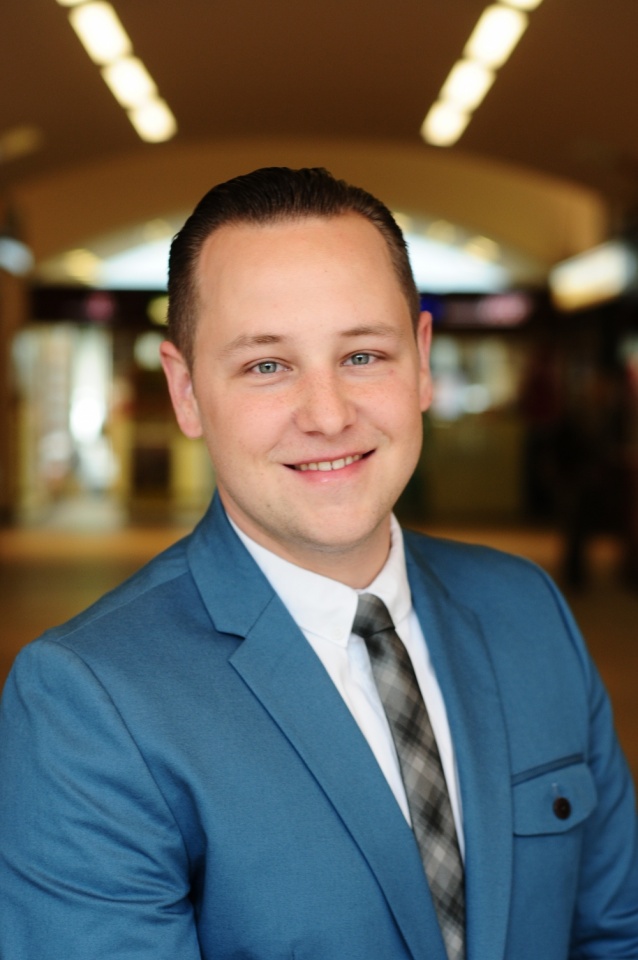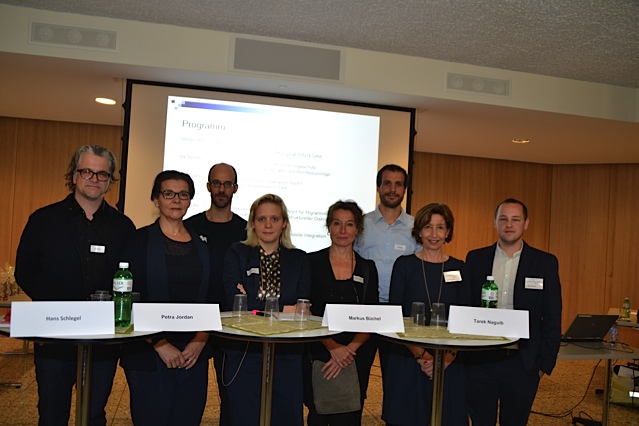Interview with Jakob Gähwiler

What the experts have to say about Integration.
In this series of interviews, I ask the regional, state and national experts these questions and more. What a better way to start than right here in Werdenberg.
Let me introduce you to Jakob Gähwiler, the Manager of the Cantonal Integration Department in Buchs. I think it is safe to say you are strongest man at the Mintegra Foundation – also the only one.
“So let me put it this way,” says Köbi. ”I have three bosses; Blagicà Ailovic at Director of Mintegra, Ursi Dommer, President of the Board of the Mintegra Foundation and Claudia Nef, Director of the Cantonal Integration Department.
Köbi has a master's degree from the University of Zürich, in Cultural Studies. He was able to gain practical integration experience living in Hamburg, Germany. It makes a difference when newcomers know that they are speaking to someone that has been in their shoes.
How would you, an expert, define a Very Integrated Person? And how do you become a VIP?
Once a person is informed, has built a personal network, gets out and speaks with people in the native language, has accepted or has a similar cultural background - then i consider he or she to be an extremely integrated person.
It is important that newcomers go out and make contact with others living in the area. It doesn't matter to me whether they are Swiss or from the international community.
They should be able to manage their daily lives and find their way.
I see integration as a two-way street - not a one-way street. To integrate successfully we are expected to learn the language, get out and speak to others, maybe join clubs.
Even when we do, some of us still are not accepted.
I interviewed a Greek man who has lived in Switzerland for 45 years and is a successful small business owner. For years he has chatted with his neighbor over the garden fence. Although he repeatedly invited him for a cup of coffee, the neighbor never accepted his invitation. What do you say to these people?
Integration must come from both sides.
1. The newcomer must make the first steps by informing themselves
2. Learn the language. If they are not willing to do that, then nothing else will work.
3. But once a newcomer makes these efforts, it is essential that the next step comes from the native population.
Yes, but how do we motivate locals to take the next step? What would you say to the Greek in my example?
I would say that it is more than likely the neighbor’s problem. The older Swiss generation doesn't usually visit people, outside of the family, in their homes. They believe there's a certain distance to keep with neighbors and business colleagues. I wouldn’t put so much emphasis on this example. Thank goodness my generation is different.
Tips to Conquer Obstacles
I encourage newcomers to reflect and to ask themselves:
· Have I tried everything possible?
· If someone shows no interest, forget it and move on.
· Try again with someone else.
I motivate everyone, newcomer or Swiss, not to blame everything on nationality. It is a simple matter of attitude to accept each person as an individual.
What does a VIP bring in their backpack to Switzerland? How can the Swiss society profit from us?
Anything that loosens up the Swiss is positive.
When we read stories of how things work in other countries, it helps us to appreciate our culture. We begin to question it and learn from it. The exchange with other cultures enriches our own culture.
That is the reason that I am writing this Blog and will write the VIP Book. How can anyone know something that they don’t yet know exists?
We need places that tell our stories and explain our traditions. A place for newcomers to go to remind them they are not alone, others have stumbled across the same problems. It's not easy, but possible.
“Yes, you can!”
So much is experienced on a personal level, for example if someone feels isolated or made to feel like a fool. I don’t know how we can spare them this. At some point in a new home, you will begin to feel less overwhelmed and feel at home.
We need more low-threshold services such as Frauentreff (Women’s Meetings & Coffees). Newcomers are welcome without having to meet any specific requirements or to register. Attendees can practice their language skills, meet others newcomers as well as Swiss women. They also learn how Switzerland works.
As someone becomes stronger, puts down roots, there are many groups and organization committees they can join. They can get involved, shape and have their say in their community.
You are singing my song– if you want to something to change, get involved and help make it happen. But it takes time. Maybe it would help if society turned down their expectations a couple of notches.

Integration Jungle Made Easy - What do I do if I need help?
The integration structure resembles a bureaucratic jungle for those us amateurs. There is the Mintegra Foundation, the Social Services for Foreigners, REPAS and the St. Gallen Office for Integration. Help!
The Mintegra Foundation has the mandate from; the Cantonal Center for Integration and Equality and from the VSPG – The Association of St. Gallen Community Presidents (die Verein der Gemeindepräsidenten)in the regions of Werdenberg and Sarganserland. The VSPG is responsible for REPAS, the Regional Potential and Job Center (Regionale Poetenzialabklärungs- und Arbeitsintegrationsstelle)
If someone from another country arrives and needs help, where do they go?
First, they would contact Blagicà Ailovic’, Director of the Mintegra Foundation and Social Services for Foreign Speakers. She's responsible for initial information as well as counseling and consulting.
The common practice is what is done quickly ,the community does it. What goes deeper and takes more time, Mintegra - the social services for foreigners - handles.
If individual support or advice is needed, the social services of Werdenberg takes over .
The Office for Integration handles the big picture – larger social issues that affect the population as a whole. In the form of communications, networking and projects.
Let me see if I understand correctly.
The social services are responsible for individual questions, concerns, problems and consultations, the Office for Integration for the concerns of society and large groups. Can you give me some examples?
Yes, the Office for Integration's solutions for the society as a whole some examples are:
Projects such as; Frühforderung (early development/intervention), Grenzenlos - No Borders Cultural Festival, health care and migration workshops, conferences and FrauenTreff - Women’s Meeting/Coffees for foreign speakers to name just a few.
What is Frühforderung?
Frühforderung is a play and learn program designed for three to four year olds with migration backgrounds. It begins a year before they enter kindergarten. The goal is to ease them into the school system and to teach them the language. A parent is always in attendance. It is important that a parent is involved to learn how the school system works.
It is my job to promote such preventive projects and spread the know-how necessary to other communities in the canton. The majority of the communities in St. Gallen have adopted the Frühforderung project. It works in reverse, we benefit from successful projects from other communities that we can copy.
Mintegra – The Information and Coordination Network
We don’t offer all the projects ourselves. Mintegra offers a networking and information coordination for projects in the region. A good example is the German course register which connects course providers with possible students.
We are always grateful to citizens and institutions who launch projects on their own initiative. If Mintegra backs a project with their name - quality is required.
Is Mintegra responsible for political refugee projects?
I don’t see refugee projects as part of our mandate. But we do register projects and coordinate - living integration.
The project "welcome dinner", launched by Mr. Dass is a good example. Locals invite refugees into their homes and cook them dinner. We inform and coordinate. We describe the project in our communications and make contact with committees and board of directors in our network on their behalf.
Do newcomers have all the support they need to integrate?
Whoever is willing to integrate in Werdenberg can because there are so many services and opportunities available to them.
The problem is that we have to deal with personal setbacks. Some people have experienced bullying and rejection and retreat to protect themselves. If someone has a problem Mintegra is there for them -take advantage of it. It shouldn’t be taken for granted.
How can we, the VIP’s and the local Swiss, make the newcomers feel that they are a part of society?
That is what we try to accomplish everyday. We want to give newcomers the feeling that they are part of society - people build the community. That they can be and already are part of that community – they belong. They just need to believe it.
And how do you put that into practice?
When people come to us, we ask them for their hobbies and abilities. We make contacts to voluntary or philanthropic organizations or to clubs. Wherever there is a possibility. Becoming a member or volunteer opens so many doors. It gives someone the opportunity to get involved, shape and determine their own lives.
Yes, feeling a part of the community. Isn't that what integration is all about?
In a perfect world how would you like integration to be perceived?
The diversity and variety that integration brings, should be viewed as a strength. Every step we take in that direction is a success. The post migration society will be much stronger. We need positive examples and make them known. We also need to publicize our services, and our counseling center better and more often.
And of course that is exactly what I am trying to accomplish with this blog.
Thanks so much for talking with us. We appreciate it. Maybe some of our readers will be interested in the Mintegra Tagung on 5. November in the Aula of the BZB in Buchs.